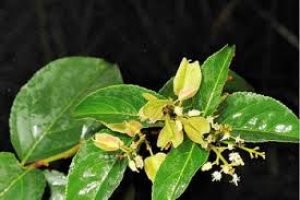
All iLive content is medically reviewed or fact checked to ensure as much factual accuracy as possible.
We have strict sourcing guidelines and only link to reputable media sites, academic research institutions and, whenever possible, medically peer reviewed studies. Note that the numbers in parentheses ([1], [2], etc.) are clickable links to these studies.
If you feel that any of our content is inaccurate, out-of-date, or otherwise questionable, please select it and press Ctrl + Enter.
Chinese three-winged tree can help fight pancreatic cancer
Last reviewed: 02.07.2025
 ">
">In malignant tumors of the pancreas, cancer cells multiply at an incredible rate, which leads to increased tumor growth and reduced chances of survival. The content of the protein GRP78, which prevents cell death, is increased in the tumor; according to some data, it is this feature that leads to the development of severe forms of cancer.
A group of researchers from the University of Minnesota, after numerous studies, came to the conclusion that with the help of triptolide extract obtained from the Chinese herb Triptolagus wilfordii, it is possible to reduce the action of the GRP78 protein, which ultimately causes the death of cancer cells.
Experts have long found out that disruptions in the body's natural process of protein folding lead to an excess of proteins in the cell, which begins to experience severe stress from this. A prolonged stressful state leads to an even greater disruption of protein folding. If this problem is not eliminated in time, the cell dies. The GRP78 protein helps to prolong the life of the cell and corrects the folding process in the body. A large accumulation of the GRP78 protein in the pancreas is what helps cancer cells survive.
An extract of the Chinese herb triptolide prevents the proliferation of cancer cells in the pancreas. This property of the plant was tested on human tissues, as a result of which scientists found that the death of pathological cells occurs due to the provocation of chronic stress.
Pancreatic cancer is being studied by many scientists from different universities and medical centers. Recently, an experiment involving more than a thousand patients was conducted in hospitals in the United States, which showed that regular intake of acetylsalicylic acid helps to significantly reduce the likelihood of developing pancreatic cancer. Among the subjects, 362 people were diagnosed with pancreatic cancer, and about 700 people were in the control group.
The experts noted the duration and dosage of aspirin intake by the participants in the experiment, and the weight and bad habits of the subjects were also taken into account.
A small dosage, which is often prescribed for preventive purposes for diseases of the heart and blood vessels (up to 325 mg per day) reduced the risk of developing a malignant tumor in the pancreas by almost 50%, while scientists noted that the longer a person drinks aspirin, the less likely the tumor is to develop. The experts also noted that when the drug was discontinued, the risks of developing a malignant tumor increased threefold within two years. However, one should not forget about the side effects that aspirin causes.
In addition, specialists are constantly developing new methods that will help to facilitate the diagnosis of cancerous tumors. At the Mayo Clinic, specialists decided to simplify the procedure for detecting pancreatic cancer using endoscopy, which is based on the study of an optical blood oxygen sensor (sensory sensitivity of more than 90%).
A small study conducted in this area showed that the effectiveness of this diagnostic method is quite high. Modern medicine does not have tests that would allow diagnosing pancreatic cancer at an early stage of development (in the vast majority of cases, pancreatic cancer is diagnosed at the metastasis stage).
The new sensor can diagnose not only changes in the tumor, but also changes in surrounding tissues that are not detected using other diagnostic procedures.

 [
[